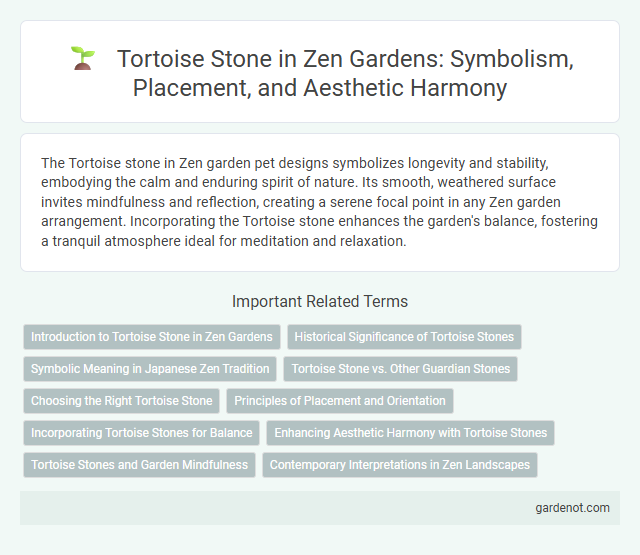The Tortoise stone in Zen garden pet designs symbolizes longevity and stability, embodying the calm and enduring spirit of nature. Its smooth, weathered surface invites mindfulness and reflection, creating a serene focal point in any Zen garden arrangement. Incorporating the Tortoise stone enhances the garden's balance, fostering a tranquil atmosphere ideal for meditation and relaxation.
Introduction to Tortoise Stone in Zen Gardens
Tortoise Stone, or "Kame-ishi," is a key element in Zen garden design symbolizing longevity and stability. This distinct, naturally weathered rock often anchors the garden's composition, enhancing the meditative atmosphere with its unique shape and texture. Its presence invites contemplation on endurance and the timeless flow of nature within traditional Japanese landscapes.
Historical Significance of Tortoise Stones
Tortoise stones, or kameishi, hold significant historical value in Zen gardens as symbolic representations of longevity and protection deeply rooted in East Asian culture. These uniquely shaped stones are often placed strategically to embody the mythological tortoise, revered in ancient Chinese and Japanese traditions for its association with wisdom and stability. Their presence in Zen gardens reflects centuries-old beliefs and artistic philosophies, bridging natural aesthetics with spiritual meaning.
Symbolic Meaning in Japanese Zen Tradition
The Tortoise stone in Japanese Zen gardens symbolizes longevity, stability, and endurance, reflecting the tortoise's revered status in East Asian culture. Its presence embodies protection and resilience, serving as a spiritual anchor that promotes tranquility and balance within the meditative landscape. Rooted in Zen tradition, the Tortoise stone encourages mindfulness and contemplation, enhancing the garden's symbolic depth.
Tortoise Stone vs. Other Guardian Stones
Tortoise Stone in Zen gardens symbolizes longevity and protection, distinguished by its rounded, smooth form resembling a tortoise shell, contrasting sharply with the sharp, angular shapes of other guardian stones like the Dragon or Lion stones. This stone's unique curved shape encourages a sense of calm and stability, promoting harmony within the garden's design. Unlike other guardian stones that evoke strength and aggression, the Tortoise Stone emphasizes endurance and steadfastness, making it integral for spiritual balance and natural flow.
Choosing the Right Tortoise Stone
Selecting the right Tortoise Stone for a Zen garden involves considering its size, texture, and symbolic significance, as these stones represent longevity and stability. Opt for smooth, weathered stones with natural curves to evoke tranquility and balance within the garden's minimalist aesthetic. Positioning the Tortoise Stone near water features or along pathways enhances its feng shui benefits, creating a harmonious and meditative environment.
Principles of Placement and Orientation
Tortoise stones in Zen gardens are strategically placed to symbolize longevity and stability, typically oriented to face the garden entrance or key focal points. Placement adheres to principles of balance and harmony, often positioned near water features or moss beds to enhance the natural flow and spiritual energy. Proper alignment ensures the stone acts as a grounding element, fostering meditation and tranquility within the garden space.
Incorporating Tortoise Stones for Balance
Tortoise stones, symbolizing longevity and stability, are essential for creating balance in a Zen garden. Their natural, rounded shapes and weathered textures harmonize with raked gravel and surrounding plant life, fostering a serene atmosphere. Strategically positioning tortoise stones at focal points enhances visual equilibrium and promotes meditative calmness.
Enhancing Aesthetic Harmony with Tortoise Stones
Tortoise stones in Zen gardens symbolize longevity and stability, enhancing aesthetic harmony by introducing natural textures and rounded shapes that complement raked gravel patterns. Their presence creates a balanced visual contrast against angular rocks, fostering a serene atmosphere that encourages mindfulness. Strategically placed tortoise stones guide the viewer's eye, unifying the garden's elements into a cohesive, tranquil space.
Tortoise Stones and Garden Mindfulness
Tortoise stones in Zen gardens symbolize longevity and stability, fostering a deep sense of garden mindfulness through their ancient, weathered presence. These carefully placed stones encourage meditation and reflection by representing the tortoise's slow, deliberate movement, helping practitioners cultivate patience and inner calm. Incorporating tortoise stones enhances the garden's contemplative atmosphere, aligning with Zen principles of harmony and balance.
Contemporary Interpretations in Zen Landscapes
The Tortoise stone in contemporary Zen gardens symbolizes longevity and stability, integrating traditional symbolism with modern design principles. Its smooth, rounded form serves as a focal point that encourages mindfulness and contemplation while blending seamlessly with minimalist elements like raked gravel and sparse plantings. Contemporary interpretations emphasize the stone's natural texture and shape, enhancing spatial harmony and evoking a sense of timelessness within urban or private Zen landscapes.
Tortoise stone Infographic

 gardenot.com
gardenot.com